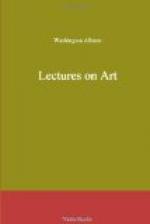Nor do we contradict our position, when we admit, in certain cases,—for instance, in the producer,—the necessity of a nicer organization, in order to the more perfect transmission of the finer emotions; inasmuch as what is to be communicated in space and time must needs be by some medium adapted thereto.
Such a person as Paganini, it is said, was able to “discourse most excellent music” on a ballad-monger’s fiddle; yet will any one question that he needed an instrument of somewhat finer construction to show forth his full powers? Nay, we might add, that he needed no less than the most delicate Cremona,—some instrument, as it were, articulated into humanity,—to have inhaled and respired those attenuated strains, which, those who heard them think it hardly extravagant to say, seemed almost to embody silence.
Now this mechanical instrument, by means of which such marvels were wrought, is but one of the many visible symbols of that more subtile instrument through which the mind acts when it would manifest itself. It would be too absurd to ask if any one believed that the music we speak of was created, as well as conveyed, by the instrument. The violin of Paganini may still be seen and handled; but the soul that inspired it is buried with its master.
If we admit a distinction between mind and matter, and the result we speak of be purely mental, we should contradict the universal law of nature to assign such a product to mere matter, inasmuch as the natural law forbids in the lower the production of the higher. Take an example from one of the lower forms of organic life,—a common vegetable. Will any one assert that the surrounding inorganic elements of air, earth, heat, and water produce its peculiar form? Though some, or all, of these may be essential to its developement, they are so only as its predetermined correlatives, without which its existence could not be manifested; and in like manner must the peculiar form of the vegetable preexist in its life,—in its idea,—in order to evolve by these assimilants its own proper organism.
No possible modification in the degrees or proportion of these elements can change the specific form of a plant,—for instance, a cabbage into a cauliflower; it must ever remain a cabbage, small or large, good or bad. So, too, is the external world to the mind; which needs, also, as the condition of its manifestation, its objective correlative. Hence the presence of some outward object, predetermined to correspond to the preexisting idea in its living power, is essential to the evolution of its proper end,—the pleasurable emotion. We beg it may be noted that we do not say sensation. And hence we hold ourself justified in speaking of such presence as simply the occasion, or condition, and not, per se, the cause. And hence, moreover, may be inferred the absolute necessity of Dual Forces in order to the actual existence of any thing. One alone, the incomprehensible Author of all things, is self-subsisting in his perfect Unity.




